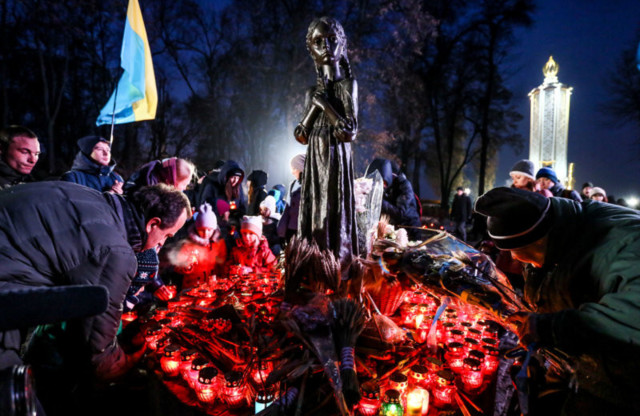
Kuva:Ukrainians light candles and place flowers during the memorial ceremony near a monument to the victims of the Holodomor, a man-made famine of 1932-33 under Soviet totalitarian Josef Stalin. on Nov. 24, 2018. Photo by Oleg Petrasiuk
Tässä on nyt kuitenkin ukrainalainen lähde, joka ensinnäkin paheksuu käännettä, ja esittää sen yksipuolisessa valossakin. Kysymys ei ole vain siitä, ettei Saksan perus-tuslakituomioistuimen ja EIT:n ”omiin” oikeusperiaatteisiin kuulu takautuva tuomio myöhemmin säädetystä rikostyypistä (vaan olisi joukko erillisiä henkirikoksia, jatket-tuja murhia eri paikoissa), vaan myös siitä,ettei YK ole tällasita kokaan todennut eikä tulekaan toteamaan, ja esimerkiksi Ranskan Perustuslakituomioistuin onkin sitten suoraan sidoksissa YK:n Peruskirjaan (maan omilla päätöksillä). YK:n laissa ei ole ehdotonta takautuvan tuomion kieltoa.Noiden välillä ei voi ”surffata” lause kerrallaan.
https://www.kyivpost.com/ukraine-politics/german-foreign-ministry-oppose…
” German foreign ministry opposes petition to recognize Holodomor as genocide
By Artur Korniienko.
Published Oct. 22 at 6:21 pm
Germany’s Federal Foreign Office opposes a petition to recognize the Holodomor, the Soviet manmade famine that killed roughly 4 million Ukrainians in 1932-1933, as genocide, according to Arnold Vaatz, a lawmaker with Germany’s ruling Christian Democratic Union party.
“The Foreign Ministry wants the petition to be rejected on the grounds that the concept of genocide was not defined until 1951,” Vaatz told the Ukrainian office of Deutsche Welle, the state-owned German broadcaster, in an interview on Oct. 21.
Vaatz says it’s a dangerous argument because supporters of National Socialism could demand the revaluation of Adolf Hitler’s genocide in the 1940s on the same grounds.
“In my opinion, this argument is very technocratic,” Vaatz said. “The same applies to another argument that, besides Ukrainians, this artificially arranged famine had other victims in Russia and the Caucasus, in particular. This argument, in my opinion, also seems more like an excuse.”
Vaatz is a member of the petition committee in Germany’s Bundestag, which discussed the petition at an open meeting on Oct. 21, 2019 after hearing the Foreign Office’s evaluation of the document. The Committee consists of 28 lawmakers from different parliamentary factions.
Next, the petition committee will either ask the Foreign Office to implement the petition or reject it. Vaatz says that rejection is more likely because of the Foreign Office’s opposition to it. Either way, parliament will vote on the committee’s decision, and it will likely be included in a package of other proposals.
“I think this (rejecting the petition) is wrong. Colleagues who think the same way will likely apply to vote in favor of this petition in the Bundestag as a separate item. But probably there won’t be a majority to adopt this petition in the Bundestag", Vaatz says.
A similar petition has already been rejected by the petition committee in 2016 after the Foreign Office opposed it on similar grounds. At the time, the Christian Democra-tic Union (CDU), which was more welcoming to the petition, had even more seats in the parliament. In the current convocation, the CDU is opposed by the Alternative for Germany party, which supports lifting sanctions on Russia and will most likely vote against the petition.
The committee will now process what was discussed at the open meeting. Vaatz thinks that the issue will be put on the Bundestag’s agenda this year.
The petition was registered in December 2018 and collected the required 50,000 sig-natures before the May 27 deadline. It now has over 56,000 signatures. Citizens of any country could sign the petition.
“This was not an ‘ordinary famine’ caused by crop failures,weather disasters or such. It was a crime – an artificial, organized famine that had cost tens of millions of Ukrai-nian lives and starved a nation of farmers. This inhumane and monstrous act was ordered by Josef Stalin, who wanted to break the resistance of the rural Ukrainian population against forced collectivization and aimed at destroying the cultural and religious life of Ukraine,” the petition says.
Nataliia Tkachuk, a Ukrainian activist living in Germany, initiated the petition. Ukraine’s Ministry of Foreign Affairs and diplomats, including former Foreign Minister Pavlo Klimkin, have promoted the signing of the petition.
“Friends, our moral obligation to the millions of innocent victims of the Holodomor is to let the memory of them and the tragedy of the Ukrainian people live in the world. The world should know the truth about the bloody, cannibalistic crimes of the Soviet regime in order to be able to respond to the modern displays of Stalinism that the present Russian authorities cherish,” Klimkin said on Facebook in April.
The U.S. House of Representatives and Senate both unanimously recognized the Holodomor as genocide of the Ukrainian people in 2018. Twenty-three U.S. states have also adopted such resolutions.
Besides the U.S., the Holodomor had been recognized as genocide by 15 countries, including Australia, Canada, Estonia, Hungary, Mexico, Poland and the Vatican. ”
https://www.pirkanblogit.fi/2017/risto_koivula/ukrainan-jarjestetty-nalanhata-jenkit-nato/
”Ukrainan järjestetty nälänhätä”, jenkit, NATO …
Nämä versiot EIVÄT muodosta etenevän tiedon sarjaa,edellinen ei sisälly seuraa- vaan (parempaan!) ”kumoutuneessa muodossa”,kuten dialektikko edellyttäisi tieteel-tä, vaan nämä eri ”teoriat” kumoavat toisensa muodollisloogisesti. Viimeisin on tieteelliseltä kannalta tyhmin.
Venäläiset ovat kumma kyllä salailleet aina näihin päiviin asti nimenomaan tietoja, jotka osoittavat ”kansanmurhateoriat” varmasti vääriksi!
Väestötiedot eivät kerro selittämättömistä joukkotuhoista.
Kommentit